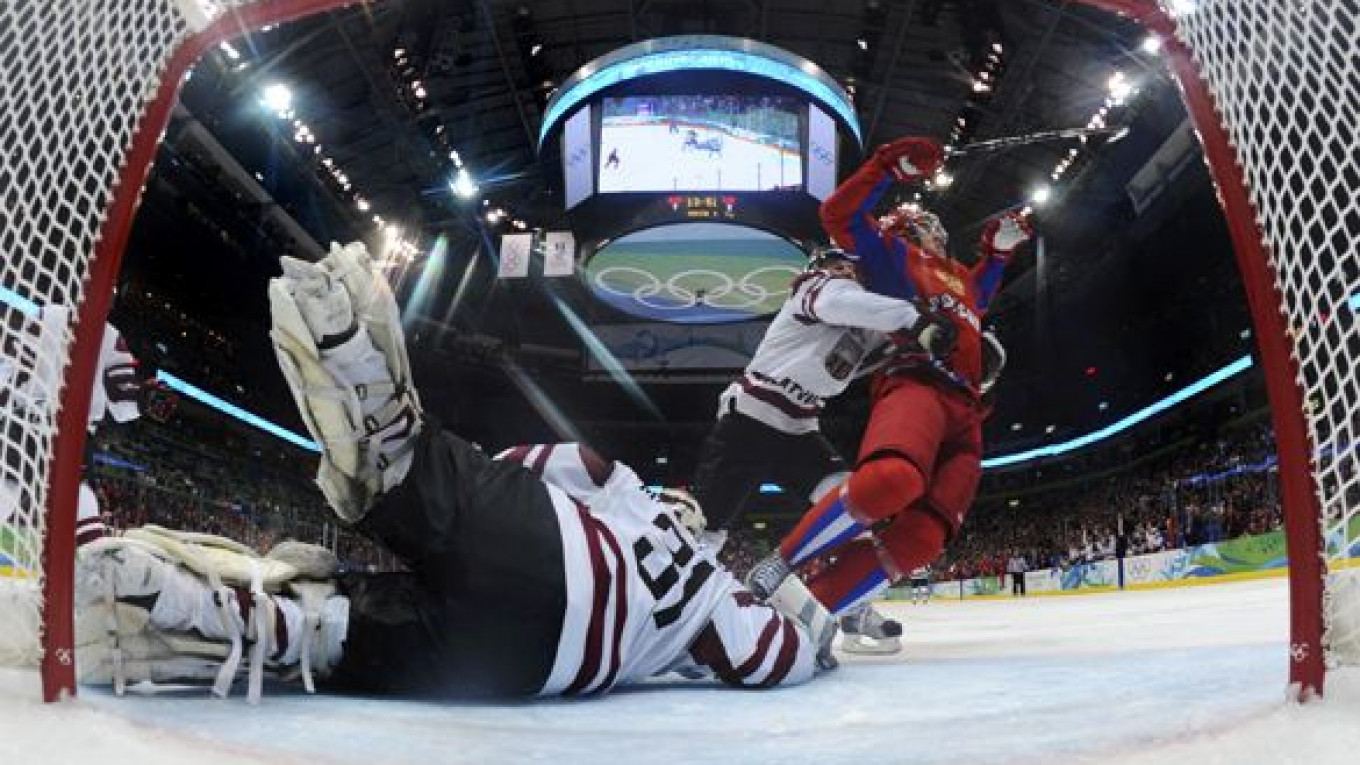A rough week for Russian Olympians at the Vancouver Games has left fans, athletes and officials searching for explanations for the team's paltry medal tally after five days of competition.
Bad weather and doping tests are just a few they've settled on.
Some prognosticators had suggested that Russian athletes could bring home 30 medals from the 2010 Winter Olympics, but as of Wednesday the team could boast of just one: a bronze from speed skater Ivan Skobrev in the 5,000-meter race Saturday.
Russia's haul so far has left the team ranked 19th in the medal table, just after tiny former Soviet republic Estonia. Russian Olympic Committee President Leonid Tyagachyov remained optimistic Wednesday, saying better results were on their way.
"There has been a bit of bad fortune, but the picture will be different tomorrow," Tyagachyov said, Itar-Tass reported.
On Tuesday, Sports, Tourism and Youth Politics Minister Vitaly Mutko said the Russian Olympic team traditionally starts slowly but eventually finds its rhythm. "There is no need to hurry up with the criticism. The Olympics have just begun," he said.
Things may indeed be looking up. Star figure skater Yevgeny Plushchenko had a slim lead over his rivals in the men's competition thanks to his successful execution of the controversial quadruple jump on Tuesday.
Led by Alexander Ovechkin and Danis Zaripov, meanwhile, the men's hockey team dominated Latvia 8-2 on Tuesday on opening day of the Olympic tournament. But Russian coach Vyacheslav Bykov said Wednesday that the hockey team did not want to win merely to cover the lack of medals by other Russian athletes.
"We are not firefighters," Bykov said, RIA-Novosti reported. "We hope that other athletes will succeed, too."
The women's hockey team had a less stellar outing, losing 13-0 to the United States.
Perhaps the most noteworthy disappointment for the Russian team so far has been the failure of pairs skaters Yuko Kavaguti and Alexander Smirnov to medal on Monday. It was the first time since 1964 that neither a Soviet nor Russian duo had secured a medal in the pairs competition.
The highly touted Russian biathletes have had a comparably rough go, failing to capture a single medal so far. Billionaire businessman Mikhail Prokhorov, head of the Russian Biathlon Union, said the rainy weather was in part to blame for the team's weak performance, though he did not let the competitors off the hook.
"The results of the sprint were strongly affected by the weather conditions, but it should be admitted that the athletes looked very weak in the last round," Prokhorov said in a statement Sunday.
Svetlana Zhurova, an Olympic champion speed skater and State Duma Deputy with the ruling United Russia party, said in televised remarks Wednesday that the performance of Russian athletes in Vancouver looks "sad" and that the frequent doping tests may be negatively influencing the Russian team.
Yury Charkovsky, coach for the cross-country skiing team, said four of his athletes were woken up at 6 a.m. to submit doping samples, robbing them of an hour of sleep. He dismissed suggestions of a possible conspiracy theory against Russian competitors, however.
"I don't believe in a bias approach of anti-doping [officials]," Charkovsky said, Nevskoye Vremya reported on its web site. "We are to blame ourselves."
Russians were not the only ones to complain about the doping tests. Swedish cross-country skier Charlotte Kalla, who won the gold medal Monday in the 10-kilometer freestyle competition, told reporters that she was extremely stressed before the race because doping officials forced her to undress for the test, Komsomolskaya Pravda reported Wednesday, citing Swedish media.
Experts cited another possible reason for Russia's underwhelming performance so far: The Vancouver Games are the first for a generation of athletes brought up exclusively in post-Soviet Russia.
The heart of the team consists of athletes who began their careers in the 1990s, after the once dominant Soviet sports machine had ground to a halt and the Russian sports infrastructure withered, Zhurova said.
"We will be giving ground for two more years," she said.
A Message from The Moscow Times:
Dear readers,
We are facing unprecedented challenges. Russia's Prosecutor General's Office has designated The Moscow Times as an "undesirable" organization, criminalizing our work and putting our staff at risk of prosecution. This follows our earlier unjust labeling as a "foreign agent."
These actions are direct attempts to silence independent journalism in Russia. The authorities claim our work "discredits the decisions of the Russian leadership." We see things differently: we strive to provide accurate, unbiased reporting on Russia.
We, the journalists of The Moscow Times, refuse to be silenced. But to continue our work, we need your help.
Your support, no matter how small, makes a world of difference. If you can, please support us monthly starting from just $2. It's quick to set up, and every contribution makes a significant impact.
By supporting The Moscow Times, you're defending open, independent journalism in the face of repression. Thank you for standing with us.
Remind me later.


